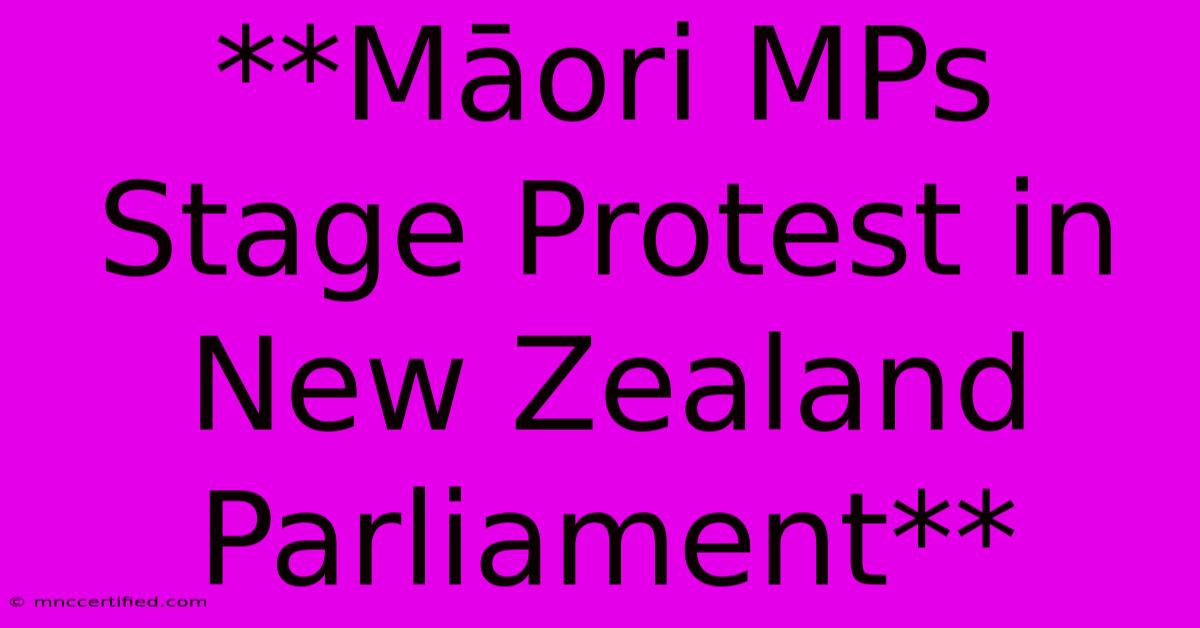**Māori MPs Stage Protest In New Zealand Parliament**

Table of Contents
Māori MPs Stage Protest in New Zealand Parliament: A Fight for Representation
On [Date of Protest], a significant protest unfolded within the hallowed halls of the New Zealand Parliament. Māori Members of Parliament (MPs) took a powerful stand, demanding greater recognition and action on critical issues impacting their communities. This article delves into the details of this impactful protest, exploring its causes, the MPs involved, and its broader implications for Māori representation in New Zealand's political landscape.
The Roots of the Protest: Unresolved Grievances
The protest was fueled by a culmination of long-standing grievances and unmet promises. Key issues driving the MPs' actions included:
-
Underrepresentation in Government: Māori MPs highlighted the ongoing disparity between Māori representation in Parliament and their proportion of the national population. This persistent underrepresentation translates to a lack of voice and influence on policies directly affecting Māori communities. The call for co-governance and meaningful consultation continues to be a central demand.
-
Inadequate Funding for Māori Initiatives: Insufficient funding for vital services and initiatives aimed at improving Māori health, education, and economic well-being was a significant point of contention. The MPs argued that current allocations fall far short of what is needed to address historical injustices and achieve equity. They specifically cited a lack of funding for Māori health services, Māori education programs, and initiatives to close the socio-economic gap.
-
Unfulfilled Treaty Promises: The protest served as a stark reminder of the unfulfilled promises enshrined in the Treaty of Waitangi, the foundational document of New Zealand. Māori MPs emphasized the ongoing breach of the Treaty's principles of partnership, protection, and active participation in decision-making processes that affect their people. This lack of Treaty settlements and the slow pace of reconciliation fueled the urgency of their actions.
-
Environmental Concerns: The plight of Māori communities facing environmental injustices, such as the destruction of culturally significant sites and the impact of climate change on their lands, also played a significant role in escalating tensions. Concerns over water rights, land protection, and the impacts of climate change on Māori communities are inextricably linked to their protest.
The Protest: Tactics and Impact
The protest itself involved [Describe the tactics used: e.g., walkouts, speeches, occupation of a specific area, symbolic actions]. [Name prominent MPs involved] were among the key figures spearheading the demonstration. The protest gained significant media attention, both nationally and internationally, raising awareness of the issues at stake and placing pressure on the government to address the concerns. The actions taken by the Māori MPs highlighted their commitment to fighting for a more just and equitable New Zealand.
The impact of the protest extended beyond immediate media coverage. It galvanized public opinion, fostering a renewed conversation around Māori rights and representation. The protest is considered a crucial step in the ongoing struggle for genuine self-determination for Māori.
Looking Ahead: The Path to Reconciliation
The protest by Māori MPs serves as a powerful call to action, highlighting the need for systemic change in New Zealand's political system. The path forward requires genuine dialogue, commitment to meaningful consultation, and concrete steps towards addressing the historical and ongoing injustices faced by Māori communities. This includes:
- Increasing Māori Representation: Implementing measures to ensure Māori voices are proportionally represented in Parliament and across all levels of government is crucial.
- Increased Funding for Māori Initiatives: Allocating adequate resources to address the specific needs of Māori communities in health, education, and economic development is essential.
- Honoring the Treaty of Waitangi: Prioritizing the fulfillment of Treaty promises and ensuring genuine partnership in decision-making processes are non-negotiable.
- Environmental Justice for Māori: Protecting Māori lands and resources and addressing environmental injustices impacting their communities are paramount.
This protest was not just a display of dissent; it was a powerful assertion of Māori rights and a call for a more inclusive and equitable future for all New Zealanders. The ongoing dialogue and actions following this protest will shape the trajectory of Māori representation and the future of New Zealand.
Keywords: Māori MPs, New Zealand Parliament, Protest, Māori representation, co-governance, Treaty of Waitangi, Māori rights, self-determination, underrepresentation, funding, health, education, environment, socio-economic gap, Treaty settlements, water rights, land protection, climate change, political action.

Thank you for visiting our website wich cover about **Māori MPs Stage Protest In New Zealand Parliament**. We hope the information provided has been useful to you. Feel free to contact us if you have any questions or need further assistance. See you next time and dont miss to bookmark.
Featured Posts
-
Eagles Vs Commanders Tv Channel And Time
Nov 15, 2024
-
West Indies Vs England 3rd T20 I Live
Nov 15, 2024
-
Sky This Week Nov 15 22 2024 Supermoon
Nov 15, 2024
-
How England Overtook Greece In Nations League
Nov 15, 2024
-
Craig Melvin Joins Today Co Anchor With
Nov 15, 2024